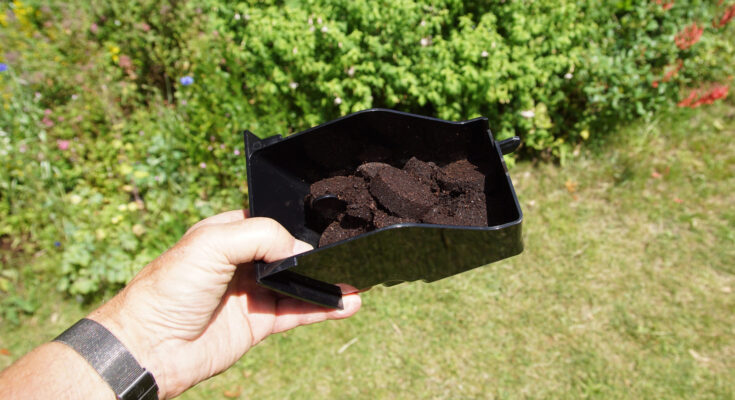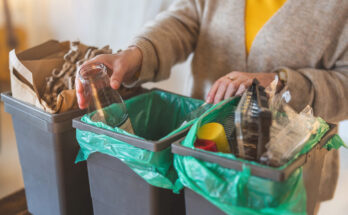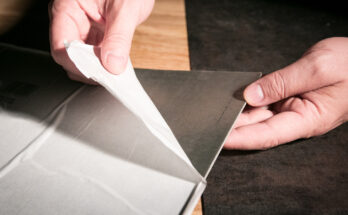Why You Should Start Sprinkling Leftover Coffee Grounds On Your Lawn
Make enough cups of coffee at home, and you’re bound to start wondering what kind of things you can and can’t do with leftover coffee grounds around your garden. Luckily for your lawn, coffee grounds make an excellent natural fertilizer, particularly when combined with other amendments.
Fertilizers are essential for a healthy lawn. Plants require specific nutrients for key functions like growing roots and leaves. Those nutrients aren’t always naturally present in the soil in sufficient amounts, and fertilizers help fill the gap. You can easily see the difference between a properly fertilized lawn and one that isn’t — it’s healthier, thicker, and greener. In time, fertilizers make lawns more resistant to weeds, diseases, and even foot traffic. The three most important nutrients are nitrogen, phosphorus, and potassium. While you can do a soil test to determine your own lawn’s fertilizer needs, nitrogen is typically the most important nutrient for healthy grass growth.
That’s where coffee grounds come in. Fertilizing is a genius way to use leftover coffee grounds: They contain a small amount of nitrogen, about 2.5% to 3% of their total content. It’s a slow-release source of nitrogen, which reduces the chance of leaf burn in comparison to quick-release synthetic nitrogen fertilizers. While the nitrogen itself is helpful, that’s only the beginning of the benefits of coffee grounds for your lawn.
Why coffee grounds are so helpful for lawns
Much of the nitrogen in spent coffee grounds goes not toward the grass roots, but to the microorganisms in the soil. But since soil microorganisms are so important for soil health, that’s good news. The result is that coffee grounds improve the structure of the soil, improve drainage, and aid both moisture retention and nutrient retention. These benefits are both short-term and long-term, and research has even found coffee grounds to be equally or more effective than peat moss, which is currently the most common organic matter amendment in soil mixes.
Coffee grounds also contain small amounts of the other main plant nutrients, phosphorus and potassium. And they contain micronutrients that commercial fertilizers usually don’t have, including magnesium, copper, and calcium. They have a relatively neutral pH, so you won’t risk shifting the lawn’s soil out of its ideal pH range. The grounds can also be used as a mulch, especially when blended with other mulching materials, to protect the soil and prevent weeds. In short, there’s much to gain and nothing to lose by adding your next batch of coffee grounds to your lawn — as long as you do it right.
Downsides and how to prevent them
Since coffee grounds only contain small amounts of the three main plant nutrients, they shouldn’t be your only lawn fertilizer. Rather than sprinkling coffee grounds on your yard and calling it a day, think of them as a booster — they work best to improve the effectiveness of existing fertilizers, whether natural or synthetic. (Other natural nitrogen fertilizers include alfalfa seed meal, feather meal, or blood meal.) When using coffee grounds as mulch, combine them with lawn clippings, wood chips, or tree needles for best results. Alternatively, compost the coffee grounds first, then use the finished compost on your lawn.
It’s also important to avoid adding so many coffee grounds that they form a thick crust over the lawn. Like any fertilizer or mulch, they can ruin the soil if overdone. Sprinkling the grounds is fine, but it’s even better to work them into the soil if you’re not composting them first. You’ll also want to dry them out, before mold or mildew sets in, by spreading them on a newspaper-lined baking sheet, laying them in a sunny, open area for a few days, and stirring regularly.
Only spent coffee grounds are appropriate for your lawn, not fresh, as fresh grounds can adversely affect the pH balance of the soil. That means it may be difficult to get your hands on enough coffee grounds to apply to an entire lawn. One option is to save up your spent grounds until you have enough. Many coffee shops also give away their used grounds for compost or fertilizer. All you have to do is ask.



